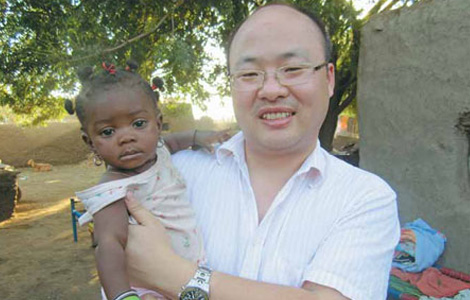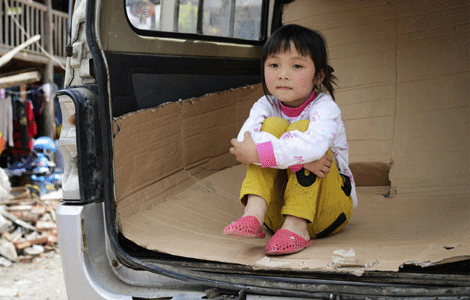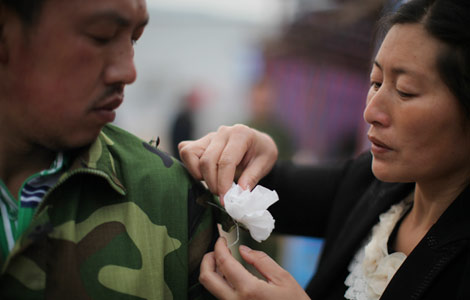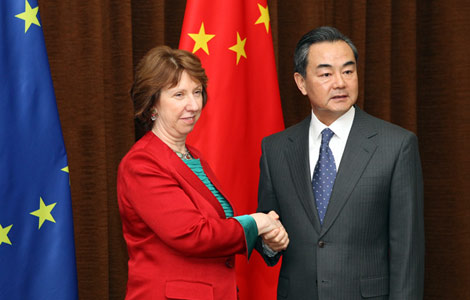US needs to do some soul-searching
Updated: 2013-04-29 12:19
By Chen Weihua (China Daily)
|
||||||||
The Boston Marathon bombings that killed three people, including 23-year-old Lu Lingzi, a Chinese graduate student at Boston University, and left more than 260 injured, were a senseless attack of terrorism to say the least.
The wounded suspect, 19-year-old Dzhokhar Tsarnaev, told interrogators this week that he and his 26-year-old brother Tamerlan, who was killed in a subsequent police encounter, were motivated by radical Islamic views and anger over the US-led wars in Iraq and Afghanistan.
Though Tsarnaev claimed that he and his brother were self-radicalized and did not belong to any organization, investigations by FBI and the inquisitive media have continued, spreading all the way to Russia's Dagestan, from where the brothers migrated to the US 10 years ago.
While family members and relatives of the victims of the Boston bombings are still grieving and more facts could be uncovered about the suspects, some US news organizations have tried to dig deeper into the truth.
For many, the answer to such questions is simple: Terrorists hate American values and the American way of life. That was reflected in US Vice-President Joe Biden's speech at the memorial service for slain Massachusetts Institute of Technology police officer Sean Collier on Wednesday.
Biden said terrorist attacks are carried out to "instill fear" and "jettison what we value most and the world most values about us, our open society, our system of justice that guarantees freedom". But he did not explain why the suspects were angry at the US for launching the wars in Iraq and Afghanistan and causing civilian casualties there.
A report by Brown University's Watson Institute for International Studies in 2011 put the total number of civilian deaths in Iraq and Afghanistan at 132,000. This does not include indirect deaths or people who lost their limbs or have been suffering emotional trauma.
US troops are responsible for part of the civilian casualties, and public protests against the killings have made constant headlines over the past decade. Even Afghan President Hamid Karzai has repeatedly pleaded with foreign military forces in his country to stop killing civilians during their operations.
It's no secret that anti-American sentiments have gained strength in many parts of the Muslim world since the start of the wars in Iraq and Afghanistan. And Pew Center and Gallup surveys show that relations between the West and the Muslim nations have deteriorated over the years. US President Barack Obama realized this and tried to mend relations with the Muslim world. But his move lost its effectiveness after he dramatically escalated the controversial drone attacks in several Muslim countries.
One foreign policy expert in Washington, a Muslim, told me that he felt sad when Obama repeatedly proclaimed during last year's presidential campaign that he was a Christian, implying that he was not a Muslim as some Americans have suggested. It is apparent that while condemning attacks such as the bombings in Boston, Washington also needs to do some soul-searching to see whether some of its foreign policies have contributed to the radicalization of young people in Muslim countries as well as the US.
Homegrown Muslim radicals are becoming a big problem for the US. The Boston bombings, the shooting at Fort Hood, Texas, in 2009 in which US Army Major Nidal Hasan killed 13 people and injured more than 30, and the attempted attack on Times Square by Pakistani-American Faisal Shahzad are examples of radicalization of Americans.
There is nothing to defend those behind the Boston bombings, but the US could find the reasons why young Muslims are becoming increasingly radicalized by reviewing its foreign policy and rectifying it if necessary to minimize the chances of such attacks in the future.
The author, based in Washington DC, is deputy editor of China Daily USA.
Most Viewed
Editor's Picks

|

|

|

|

|

|
Today's Top News
Chinese NGOs reach out to African countries
Abe defends shrine visits
Premier Li: 'High alert' to remain on bird flu
China to enhance ties with Argentina
Technology fair eyes innovation
'Wang-Koo meeting' anniversary marked in Taipei
China joins rush for Mars
A camper's life traveling the open road
US Weekly

|

|














